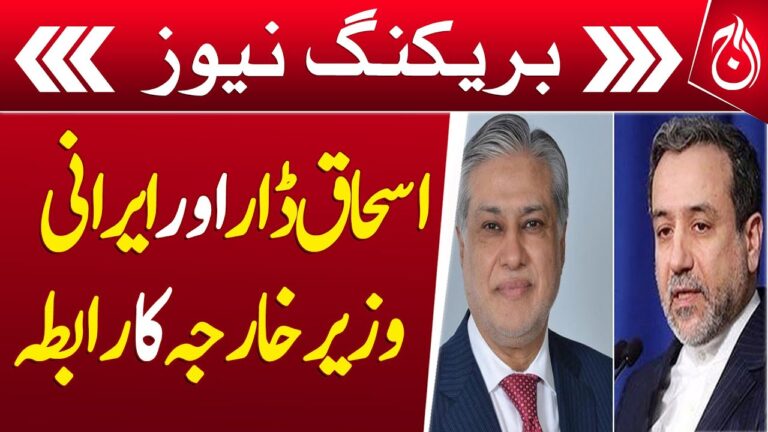Ishaq Dar and Iranian Foreign Minister Connect: A Diplomatic Milestone Amidst Regional Tensions
In a significant diplomatic development, Ishaq Dar, the Finance Minister of Pakistan, has recently engaged in discussions with Iranian Foreign Minister Hossein Amir-Abdollahian. This contact has sparked interest and optimism regarding the strengthening of economic ties between the two neighbors. This article will delve into the implications of this interaction, the context of Pakistan-Iran relations, and what it means for both nations moving forward.

The Significance of the Contact
The meeting between Ishaq Dar and Hossein Amir-Abdollahian marks a pivotal moment in Pakistan-Iran relations, which have historically been complex. With both nations facing various economic challenges, this engagement highlights the potential for collaborative growth. According to World Bank data, Pakistan’s GDP growth is projected to be around 2% for 2023, while Iran is experiencing economic contraction. This underscores the necessity for both nations to explore mutually beneficial partnerships that can bolster their economies.
Historical Context of Pakistan-Iran Relations
Since the establishment of diplomatic ties in 1950, Pakistan and Iran have had their fair share of ups and downs, oscillating between cooperation and rivalry. One of the most notable aspects of their relationship has been their joint efforts to enhance trade links, despite disruptions caused by geopolitical tensions.
Both nations share a 959 km border, facilitating trade opportunities. In 2021, bilateral trade between Pakistan and Iran reached approximately $1 billion, a figure that many analysts believe can be drastically improved. This recent contact could pave the way for enhanced trade agreements and cooperation in various sectors, including energy and infrastructure.

Exploring Joint Economic Opportunities
During their discussions, Ishaq Dar and Amir-Abdollahian explored various avenues for economic partnership, particularly in the fields of energy and agriculture. Iran is a significant gas producer and could potentially supply much-needed energy to Pakistan, which has faced persistent energy crises in recent years.
According to the Pakistan Bureau of Statistics, the country imports around 30% of its gas, with much of it coming from LNG sources. A strategic partnership with Iran could reduce costs and enhance energy security. Furthermore, the agriculture sector holds immense promise, as both countries can collaborate on various projects, from technology transfers to joint ventures in producing and exporting agricultural products.
Navigating Regional Tensions
However, it is essential to acknowledge the broader geopolitical landscape that colors this diplomatic engagement. Recent tensions in the region, including issues related to Afghanistan’s stability and U.S.-Iran relations, can create challenges for Pakistan and Iran as they attempt to strengthen economic ties.
The interactions between Iran and Pakistan also come against the backdrop of the China-Pakistan Economic Corridor (CPEC), a $62 billion investment initiative aimed at boosting Pakistan’s economy. As Pakistan seeks to align itself with China, Iran’s interest in becoming a transit hub for trade routes could lead to potential synergies.

Future Prospects
The recent contact between Ishaq Dar and the Iranian Foreign Minister sets the stage for future dialogues, aimed at overcoming historical grievances and promoting sustainable economic cooperation. With a combined population of over 300 million, both nations are poised to benefit significantly from enhanced trade and bilateral relations.
Analysts suggest that increased engagement could also lead to improved diplomatic ties in other areas, such as security cooperation to combat common threats, including terrorism and narcotics trafficking. According to the Global Terrorism Index, both Pakistan and Iran have faced challenges in terms of security, making collaborative efforts essential for regional stability.
Conclusion
In summary, the contact between Ishaq Dar and Iranian Foreign Minister Hossein Amir-Abdollahian serves as a beacon of hope for the future of Pakistan-Iran relations. By focusing on economic collaboration, both countries can navigate the challenges of a complex geopolitical landscape. As this relationship develops, it is crucial for stakeholders to remain vigilant and proactive to ensure that these discussions translate into actionable and beneficial outcomes for both nations.
In a world increasingly defined by interconnectedness, the possibilities for cooperation between Pakistan and Iran may hold the key to thriving amidst adversity. The economic statistics and cooperative ventures proposed serve as a reminder that, despite historical complexities, a stronger bilateral relationship is firmly within reach.



